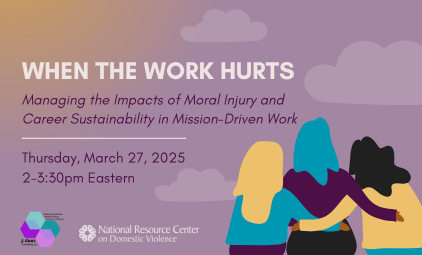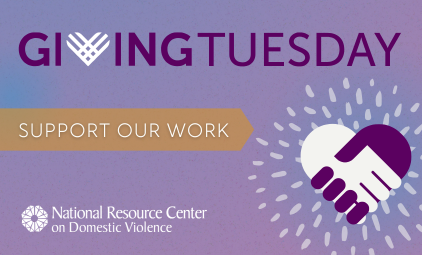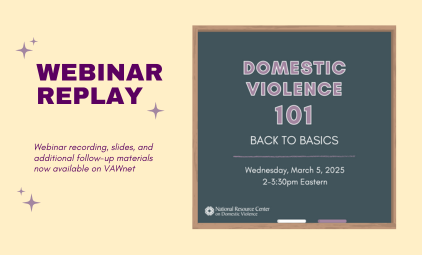![]()
A growing number of women are serving in the US military. In 2008, 11% of Veterans from the Afghanistan and Iraq military operations were women. These numbers are expected to keep rising. In fact, women are the fastest growing group of Veterans (National Center for PTSD).
Responding to the needs of female veterans who experience domestic and sexual violence is among the services that many local community-based programs will likely provide in the near future. For some programs across the country, this is already taking place. As an advocate you might not be working on a military installation, but there is a high likelihood that you might come in contact with a survivor who is active duty, in the reserves, or a veteran.
There are a number of reasons why a survivor who is active duty might seek services from a civilian domestic violence/sexual assault program. Although there are mechanisms in place for reporting, investigating, and responding to violence against military women (and men), some survivors choose not to utilize those services. Shame, fear of career related repercussions, and guilt are among the many reasons why active duty survivors might choose not to report to the appropriate chain of command. If the perpetrator(s) are members of the victim’s unit, a deep sense of loyalty may also make the decision to report very complicated, as units closely resemble one’s family during deployment.
CHALLENGES
What are some other stressors faced by women in the military?
Military Sexual Trauma (MST): A number of women (and men) who have served in the military experience MST. MST includes insulting sexual comments, unwanted sexual advances, and/or sexual assault. Being a victim of MST can leave women feeling alone, depressed and anxious.
Loneliness: During tough military missions, feeling that you are part of a solid, cohesive group is important. In some instances, personnel are deployed to new groups where they do not know the other service members. It can take time to build friendships and trusting relationships. Not feeling supported can be very challenging.
Worrying about family: It can be very hard for women with young children or elderly parents to be deployed for long periods of time. Service members are often given little notice. They may have to be away from home for a year or longer. Some women feel like they are “putting their lives on hold.” They worry that they can’t be watching over their loved ones. After returning home, some women face challenges related to parenting. They find that their children have changed. If they experienced trauma while deployed, certain noises, too many things happening at once, etc. can become triggers. (View Source)
Because of these stressors, many women who return from deployment experience difficulty transitioning back into civilian life. While in time many will adjust, a number of women will have more serious problems such as Post Traumatic Stress Disorder (PTSD).
Women also face higher rates of homelessness in comparison to their male counterparts. “Not only are returning service women nearly four times as likely as men to become homeless, but roughly 40% of those who experience homelessness also report having been sexually assaulted while in the military” (View Source).
SOCIETAL VIEWS
Societal views about female service members and veterans’ worth might also get in the way of help seeking and healing. Did you know that even though women have served in the U.S. military since the Revolutionary War, it wasn’t until 1988 that the Veterans Administration (VA) began offering medical and mental health services to female veterans? Some women veterans still today do not consider themselves as such.
Explore this scenario…
Imagine that there is a domestic violence survivor who happens to be a female veteran from the war in Iraq. She comes to you for services and shares that she is involved in a custody battle. The abuser exploits the fact that she was deployed for many months in the past, leaving her now 5 year old child behind. She also experienced MST while deployed and has developed PTSD as a result.
What strategies do you need to put in place to assist this survivor?















